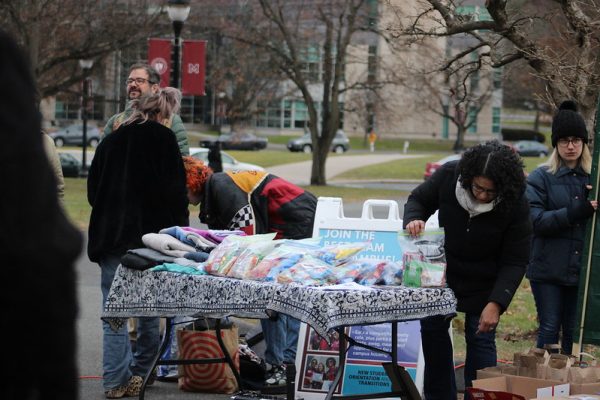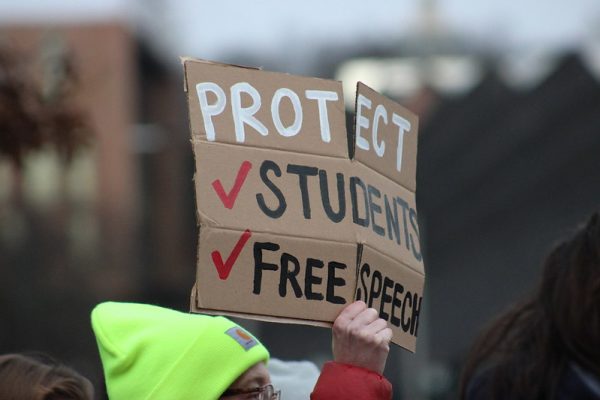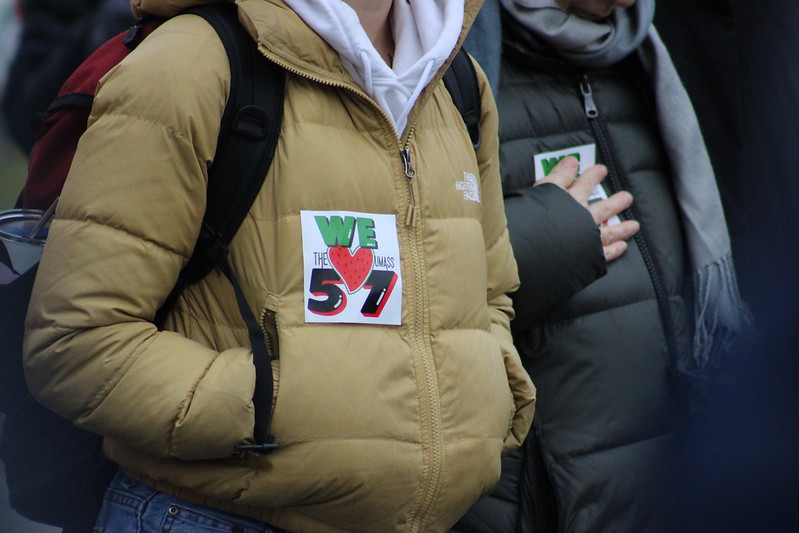Kalina Kornacki also contributed to coverage of this protest.
Editor’s Note: This article contains references to sexual violence.
On Dec. 7 at 3 p.m. around 100 people gathered in front of the Whitmore administration building to rally support for the 57 University of Massachusetts Amherst students who were arrested and charged with trespassing during a staged sit-in at Whitmore on Oct. 25.
The rally was organized by the UMass chapter of Faculty for Justice in Palestine (FJP), a recently formed group at UMass. Hoang Phan, associate professor in the English department and director of the Social Thought and Political Economy (STPEC) program is an FJP member who mediated the rally.
Attendees held signs such as “Labor Demands Ceasefire,” “Protect students, protect free speech,” and “End the occupation.” Stickers were handed out that read, “We love the UMass 57.” FJP created “care packages” for the arrested students containing various snacks, and the Mutual Aid Collective provided free warm clothes and blankets.

Phan indicated that the UMass chapter of FJP is part of a national network. UMass Boston also recently launched a chapter, according to the US Campaign for the Academic and Cultural Boycott of Israel.
Professor Sangeeta Kamat, a Grace Lee Boggs Faculty Fellow at the Center of Racial Justice and Youth Engaged Research, is a member of FJP.
“If the students are doing all of this work to organize for justice, liberation and the end of occupation, we as faculty also have a responsibility to both speak up and support the students,” Kamat said.
According to FJP, the group began forming shortly after Oct. 25 and formally launched at the end of November. There are currently about 20 faculty members, but said that their numbers are beginning to grow.
“[The faculty] felt responsible to step forward and support students at this time and let them know that they’re not alone and [are supported],” she said. “I don’t think calling for … a ceasefire, which was essentially calling for peace, [should] be criminalized.”
“It’s so good to be part of this and I’m so happy to see that an organization, a Faculty for Justice in Palestine, was established at UMass,” said Michel Moushabeck, a writer, editor, publisher and founder of Interlink Publishing. He is also a board of directors’ member for the Media Education Foundation, which has sponsored events at the Fine Arts Center regarding the Palestinian struggle.
But in order to have solidarity on campus now, the University needs to “drop the charges against those students,” Moushabeck said. “The other thing that they should do is speak to them … This is a university campus where discussions and informed debate happen. …Everybody should be able to speak without the fear that they are going to be harassed or arrested or silenced.”
Moushabeck is impressed most by the younger generation who are organizing, protesting and speaking out. “This gives me a lot of hope for the future.”
During the rally, two students who were arrested on Oct. 25 walked down the brick ramp from Whitmore after having their separate meetings with the Student Conduct and Community Standards Office.While there have been claims Chancellor Javier Reyes said the students would not be charged with Code of Student Conduct violations, his Oct. 26 statement to the UMass community indicated that they would have to navigate both the University and judicial process.

UMass alumni Kevin Murray attended the rally in support of his daughter who was arrested at the Whitmore sit-in and hopes that the University will drop their Student Conduct violations. When asked about his thoughts on his daughter’s involvement in the protest, he said he was “happy that she was taking that step to express herself.”
Murray was part of the first group of students to graduate from the STPEC program and said he noticed a shift in the campus climate since his graduation.
[STPEC] was a program designed to support students who wanted to make a difference in the world in this way. And the … University was just a different place then and I’m just disappointed to see that it’s come to this point.”
Rachel Weber, a member of FJP and the attorney representing each of the arrested students, also spoke at the rally. She described her experience as a Jewish person who has received hate and threats to her life for being involved in pro-Palestinian movements.
“In the last two months, I’ve gotten hundreds upon hundreds of very scary, vile emails. My life has been threatened. My safety has been threatened. I’ve been called the worst names you could think of, people have written out graphic descriptions of the sexual violence they hope I suffer,” she said. “How [does] targeting me for death threats … increase Jewish safety?”
Ruya Hazeyen, SJP co-president and a senior political science and Middle Eastern studies major, was one of the students arrested on Oct. 25 and took to the microphone to address the 21,000 Palestinians killed since Oct. 7.
“It’s kind of gotten to a point where I don’t know what more I could say to explain that genocide is bad. I don’t know how else I have to plea to get people to care.”
She also described the hate she has received. She detailed being called “Islamic barbaric genocidal baby rapists … And all of this for calling for a ceasefire,” she said. She said that social media and websites such as Canary Mission, an organization that compiles information on student activists and organizations they deem anti-Israel or antisemitic, have subjected her to such messages and threats.
“[UMPD and the administration] have created an environment where these accounts are allowed to thrive and allowed to harass us and doxx us and post our faces on websites.”
Hazeyen warned that an incident similar to the shooting in Burlington that left three Palestinian students hospitalized could happen at UMass. “Arabs are not safe on campus. This campus doesn’t care. We are seen as disposable.”
In part due to an effort made by the Transformative Justice Coalition (TJC) of UMass Amherst as well as student groups, faculty and parents of those arrested, the UMass Police Department altered their policy of posting identifying information of those arrested online in their daily crime logs, according to an article in The Recorder.
According to a TJC press release, the addresses and names of people who had been arrested “will now only be available in person at the UMPD building, keeping with statutory requirements that crime logs be publicly released.” This was an effort to ensure the safety of the students.
The identifying information of the arrested students was posted online since Nov. 3 and was taken down in early December.
Fergus Marshall, a resident of Chicopee, was asked by a friend — an environmental, peace and justice activist involved in the protest — to come and support the cause. Marshall and his friend are both members of the Demilitarize Western Mass, which is a “collective of anti-war, anti-imperialist, and abolitionist activists confronting the military-industrial complex in their communities,” according to Massachusetts Peace Action.
Marshall said the rally is for more than dropping the charges on the students arrested. The educational speeches made by Rachel Weber and other faculty members provided Marshall with new and diverse perspectives on the subject. But Marshall said the speeches shouldn’t end with the protests.
“Sponsor some teach-ins about what is really happening in Palestine,” Marshall said. “Make that very open and to the public. Try to educate the general public about what is happening and make sure that the narrative our government is going to make is exposed.”
From Dec. 11 to 14, the arrested students will attend their pre-trial hearings at Eastern Hampshire District Court. This is a developing story, more information on the hearings will be provided.
Jack Underhill can be reached at [email protected] and followed on X @JackUnderhill16




















